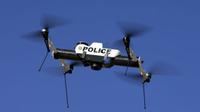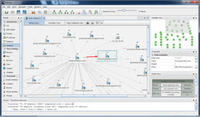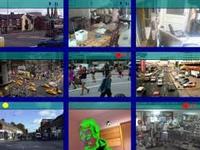-
Arizona police departments test shirt-worn, high-tech cameras
Two police departments in Arizona – Surprise and Peoria — are testing several brands of high-tech cameras that attach to an officer’s shirt; police in Mesa, Arizona used about fifty cameras for a 1-year study; the Phoenix Police Department plans on using the cameras full-time starting early next year; privacy and civil-liberties experts say the cameras can be used in a positive way, but that there needs to be a clear baseline of rules when it comes to how and when the cameras are used
-
-
Kansas history says DHS opened his mail -- again
Grant Goodman, a retired professor at the University of Kansas, was shocked when he found out that DHS opened his mail in 2005, but now that it has happened again, he just wants to know why; CBP does not need a warrant or probable cause to check international mail or cargo
-
-
License plate scanners in Canada under fire from privacy commissioners
British Columbia’s privacy commissioner is not happy about the way police departments are using their license-plate scanners; in a report released last week, Commissioner Elizabeth Denham said changes must be made to the Victoria police department’s Automated License Plate Recognition Program (ALPR), after it was discovered that the program could be used as a surveillance tool
-
-
DARPA seeking surveillance technology to predict future behavior
DARPA has teamed up with scientists from Carnegie Mellon University to create an artificial intelligence system that can watch and predict what a person will “likely” do in the future, using specially programmed software designed to analyze various real-time video surveillance feeds; the system can automatically identify and notify officials if it recognized that an action is not permitted, detecting what is described as anomalous behaviors
-
-
New cell phone surveillance method raises privacy concerns
The FBI is using a new method to access cell phone customer data,butthe American Civil Liberties Union (ACLU) contends that the method is overly invasive
-
-
Ensuring that software security policies reflect user needs
Researchers have developed a new natural language processing tool that businesses or other customers can use to ensure that software developers have a clear idea of the security policies to be incorporated into new software products
-
-
As domestic use of drones grows, privacy advocates worry

Small aerial drones are moving from the battlefield to local communities, and the pace grows faster; during the next year, drones may be used in cities and towns to help fight crime and keep officers out of danger; their use would save on the cost of fuel for police helicopters; some would feel safer as a result, but activists worry that this could be the beginning of a systemic invasion of privacy
-
-
New app uses scattered public information to put together a digital footprint of individuals, organizations

A new app application can collect scattered online clues to provide a picture of individuals or organizations; the application draws on public data sources in order to put together a graphical digital footprint
-
-
NIST awards $9 million to promote online security and privacy
The National Institute of Standards and Technology (NIST) last month announced more than $9 million in grant awards to support the National Strategy for Trusted Identities in Cyberspace (NSTIC); five U.S. organizations will pilot identity solutions which increase confidence in online transactions, prevent identity theft, and provide individuals with more control over how they share their personal information
-
-
Aussie banks considering biometric security
Australia’s major banks are considering a move to biometric security systems in an effort to boost security for their customers; the banks are changing their systems as a way for customers to keep their money and valuables safe without ATM cards
-
-
Electronic surveillance by U.S. law enforcement agencies has increased dramatically

According to data obtained by the American Civil Liberties Union (ACLU), U.S. law enforcement’s surveillance of e-mails and other Internet communication has skyrocketed in the last two years; some forms of surveillance have increased 361 percent
-
-
Law-enforcement agencies eager for Web-surveillance tools

Private technology firms are pitching software capable of analyzing large swaths of the Internet to local law enforcement looking for ways to stop the next mass shooting or domestic terrorist event before it happens; police departments hope the software will help them detect online information from terrorists, traffickers, pedophiles, and rioters
-
-
Drone use spreads to more areas and missions

As security challenges in the United State and around the globe change, many countries have one thing in common: unmanned drones will be a significant part of the future of security; advancements in technology are driving the use of UAVs into newareas
-
-
ACLU-sponsored app keeps police accountable
A new app from the ACLU of New Jersey allows people securely and discreetly to record and store interactions with police, as well as provide legal information about citizens’ rights when interacting with the police
-
-
U.S., Canada issue a joint statement of privacy principles
The United States and Canada issue a joint statement about the two countries’ perimeter security approach; the statement aims to reassure Canadians that their privacy rights would not be sacrificed to satisfy the U.S. security demands
-
- All
- Regional
- Water
- Biometrics
- Borders/Immig
- Business
- Cybersecurity
- Detection
- Disasters
- Government
- Infrastructure
- International
- Public health
- Public Safety
- Communication interoperabillity
- Emergency services
- Emergency medical services
- Fire
- First response
- IEDs
- Law Enforcement
- Law Enforcement Technology
- Military technology
- Nonlethal weapons
- Nuclear weapons
- Personal protection equipment
- Police
- Notification /alert systems
- Situational awareness
- Weapons systems
- Sci-Tech
- Sector Reports
- Surveillance
- Transportation
Advertising & Marketing: advertise@newswirepubs.com
Editorial: editor@newswirepubs.com
General: info@newswirepubs.com
2010-2011 © News Wire Publications, LLC News Wire Publications, LLC
220 Old Country Road | Suite 200 | Mineola | New York | 11501
Permissions and Policies
Editorial: editor@newswirepubs.com
General: info@newswirepubs.com
2010-2011 © News Wire Publications, LLC News Wire Publications, LLC
220 Old Country Road | Suite 200 | Mineola | New York | 11501
Permissions and Policies
